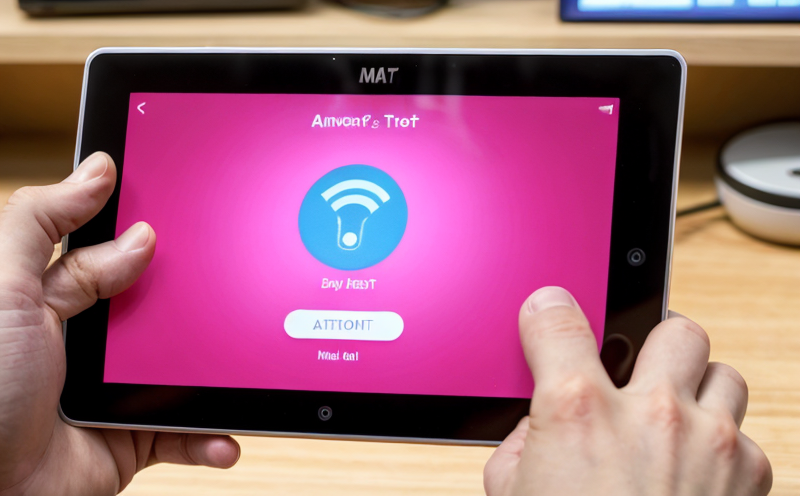Consumer Acceptance Testing of Smart Devices
In today's fast-evolving consumer electronics landscape, smart devices have become integral to daily life. These devices range from wearables like fitness trackers and smartwatches to home appliances such as refrigerators with internet connectivity. Ensuring that these products meet the expectations of consumers is paramount for any manufacturer or brand aiming to gain market share. Consumer acceptance testing (CAT) plays a crucial role in validating how well the product aligns with consumer needs, preferences, and functional requirements.
Consumer acceptance testing involves assessing various aspects of smart devices including ease of use, reliability, performance under different conditions, and overall user experience. This service ensures that products not only function as intended but also meet the high standards demanded by consumers in terms of safety, convenience, and efficiency. The testing process encompasses multiple stages, from initial concept validation to final product approval.
The primary goal is to identify any potential issues or discrepancies between the actual performance and user expectations early on during development cycles. By incorporating consumer feedback into this iterative process, manufacturers can refine their products before they reach market release, thereby enhancing both brand reputation and customer satisfaction.
For quality managers, compliance officers, R&D engineers, and procurement professionals involved in developing or sourcing smart devices, understanding the nuances of consumer acceptance testing is essential. This service helps them stay ahead of regulatory changes while ensuring that their products are competitive on global markets.
Incorporating real-world scenarios into the test protocols allows for a more accurate representation of how consumers will interact with these devices in everyday settings. For instance, simulating various environmental conditions such as temperature fluctuations or exposure to electromagnetic fields helps assess durability and reliability under adverse circumstances.
Consumer acceptance testing also focuses on ensuring that smart devices meet specific international standards like ISO/IEC 27001 for information security management systems or IEEE 802.11 for wireless LAN standards. These certifications not only add credibility to the product but also demonstrate commitment to maintaining high-quality standards throughout the supply chain.
By leveraging advanced technologies and methodologies, our lab offers comprehensive consumer acceptance testing services tailored specifically for smart devices. Our experienced team uses state-of-the-art facilities equipped with cutting-edge instrumentation to conduct rigorous evaluations based on industry best practices.
Industry Applications
| Application Area | Description |
|---|---|
| Fitness Trackers | Evaluating heart rate monitoring accuracy, battery life, and comfort during extended wear. |
| Smart Home Appliances | Testing connectivity stability between appliances within the home network. |
| Wearable Devices | Assessing water resistance levels according to IP rating specifications. |
| Voice Assistants | Measuring voice recognition accuracy across diverse accents and languages. |
| Application Area | Description |
|---|---|
| Smart Toys | Evaluating safety features for children’s use, including shock absorbency tests on materials. |
| Smart TVs | Testing picture quality under various lighting conditions and response times. |
| Wearable Medical Devices | Verifying biometric data accuracy versus clinical standards. |
| E-Scooters | Assessing stability on uneven terrain through dynamic balance simulations. |
Customer Impact and Satisfaction
- Enhanced Brand Reputation: Positive consumer feedback leads to improved brand perception and loyalty.
- Prolonged Product Lifespan: Identifying weaknesses during early stages prevents costly recalls later on.
- Better User Experience: Ensuring intuitive design improves customer satisfaction significantly.
- Informed Decision-Making: Provides detailed insights that inform strategic business decisions.
- Increased Sales: Products that meet or exceed expectations sell faster and in larger quantities.
- Reduced Costs: Early detection of flaws reduces warranty claims and repair expenses.
- Competitive Advantage: Superior testing equates to superior products, setting brands apart from competitors.
- Customer Retention: Satisfied customers are more likely to become repeat buyers or recommend the product to others.
International Acceptance and Recognition
- ISO/IEC 17025 Compliance: Ensuring adherence to international standards for testing laboratories.
- CERTIFIED by NSF International: Recognition from a globally respected organization enhances product credibility.
- ASTM E2360: Standards used in the United States for evaluating human factors engineering aspects of consumer products.
- BV (Belgium): Certification indicating compliance with stringent European regulations.
- IEC 62471: Guidelines specifically addressing light-emitting devices and their potential hazards to human health.
- CQC China Quality Certification: Approval from a leading Chinese authority boosts market presence in Asia.
- UL (Underwriters Laboratories): Widely recognized certification for product safety across North America.
- SAA Australia/New Zealand Standard: Compliance verification for products intended for sale in these regions.





